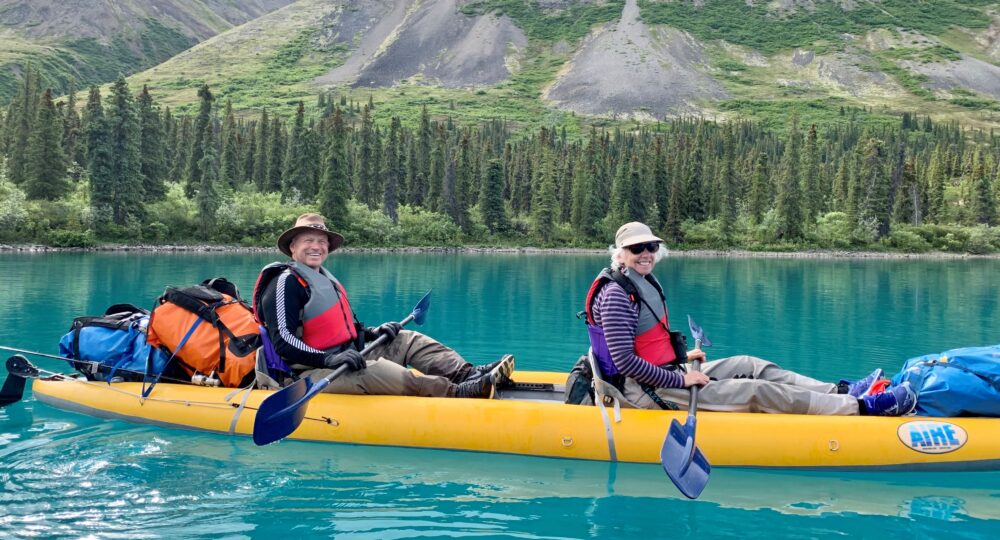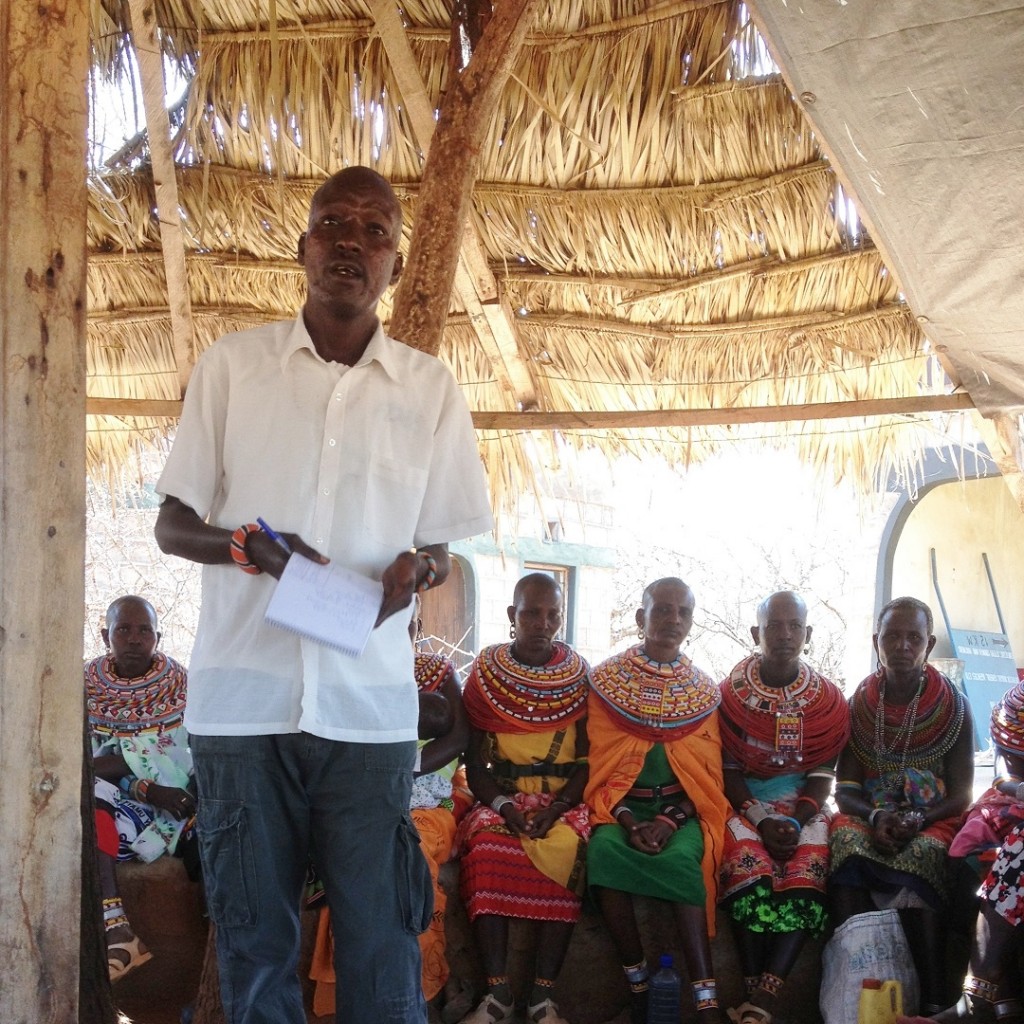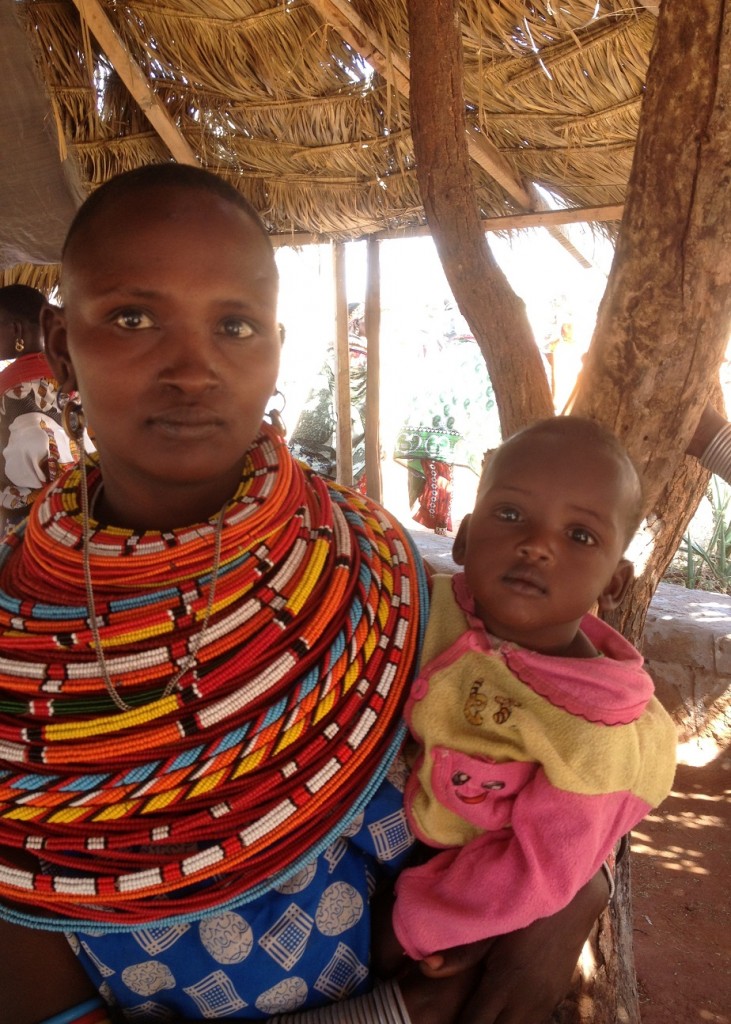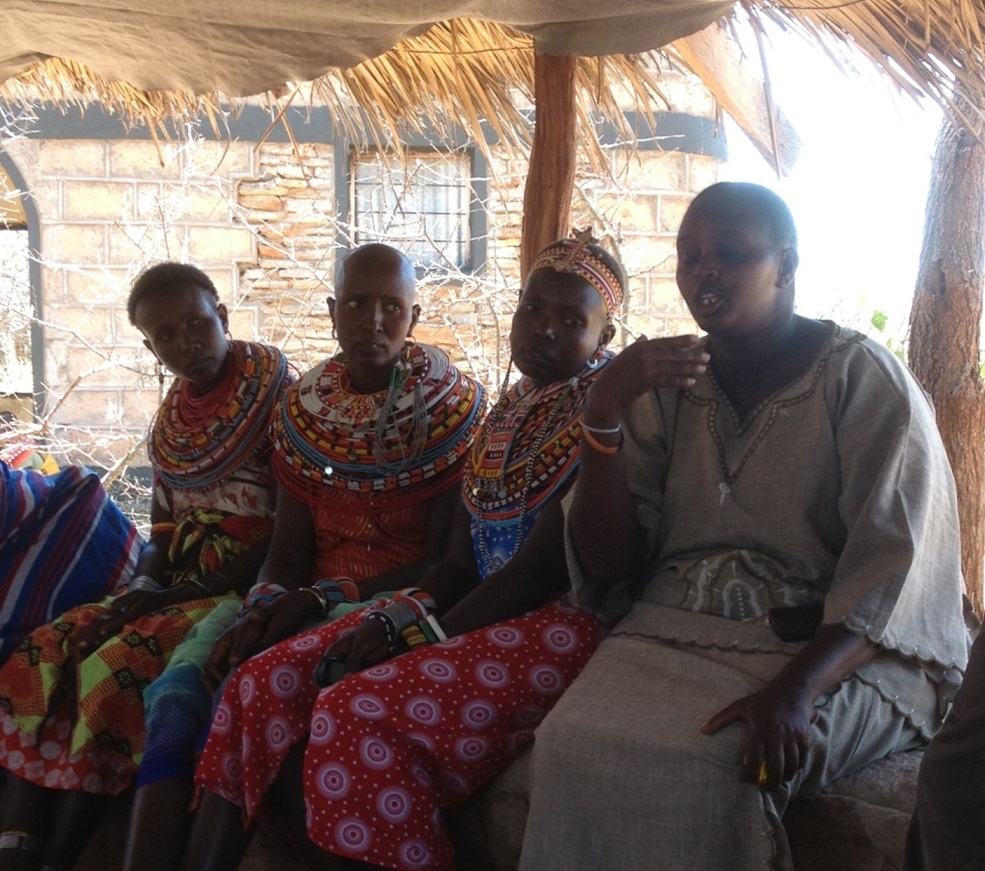In my first blog post about the beaded women of northern Kenya (A Shameless Pitch, November 10, 2013), I observed that “pastoralist women are neither empowered nor liberated.” Last week I discovered how quickly empowerment can occur given some economic leverage and I experienced the independent and determined nature of these pastoralist people.
The women bead crafters in Kalama and Sera went on strike. They refused to sell NRT the beadwork we had ordered.
When you envision such a strike, erase the image of placard-carrying, protest-chanting union workers. Replace it with rail-thin, ebony women, a quarter of whom have babies swaddled on their backs, dressed in a cacophony of brightly colored kanga (long pieces of cloth) and elaborate beading from head to toe. In the dust, underneath an acacia tree they cluster around a single, besieged man and alternate between staccato, hand-waving complaints and stony, expressionless stares. Despite obvious poverty, they will not part with their strings of beaded bracelets, key rings and coasters.
The Kalama women had gone further and taken the bold step of assembling in private. With the facilitation (instigation?) of a local curio-shop owner, they drew up a list of grievances. They were unhappy with the prices NRT paid for their products. They resented NRT’s practice of requiring cash for the raw materials they sold the women on market day but taking two weeks or longer to pay the women for the products they bought. The women accused NRT of competing with them in their local markets and they wanted an annual report that showed how much money they and NRT earned. An official face-to-face meeting between the women, the Conservancy leadership and NRT was quickly scheduled. I went as NRT’s chief negotiator.
Fortunately I’d already identified the women’s top grievances as items that needed to be addressed. The prices NRT paid for beaded items hadn’t increased for three years, our cash-based payment system was slow for the women and dangerous for NRT staff and, if we wanted to increase production, the women could not be expected to pre-fund all their raw material purchases. Three days earlier, Celina (NRT’s bead craft manager, a wonderful and strong-minded woman) and I had redone the price list with across-the-board increases. We’d scheduled a meeting with Equity Bank (Kenya’s rural development bank) to find a solution to the payment problems and I’d declared that NRT must find a workable way to provide the women with beads and other raw materials without tying up their cash. We went to the meeting ready to affirm the strikers rather than fight them, as long as everyone was reasonable.
It was a typical Kenyan 2-hour meeting: 2 hours to get there, 2 hours drinking tea, gossiping and waiting for people to arrive, 2 hours for the meeting and 2 hours to get back. We met in the shade of a circular, thatched-roofed veranda; three people from NRT, two Conservancy Board Chairs, two Conservancy Managers and 31 women in full beaded regalia who glided in, single file and sat in a ring on the veranda’s stone ledge. The meeting was facilitated by the Kalama Board Chair and conducted primarily in Samburu with translations in English and side-conversations in Kiswahili.
The women and Conservancy leadership met in private for about 15 minutes before they called us in. We started with a prayer and then launched into pricing. Items were held up one by one, the current price quoted and the desired price stipulated. The increases were unrealistic and unworkable; for the highest volume items, they wanted a 400% increase.
Now it was my turn. I asked them to clarify for me what was behind the new prices. Was it the time it took? The amount of material? The design complexity? In the end it was mostly that they liked the sound of the number and were upset because they felt unappreciated by NRT. Their hands hurt, some of the materials were tough and the needles kept pricking their fingers. I listened and was sympathetic. With the facilitator’s help, they quickly changed gears and agreed to a structured pricing exercise where they would sit down with NRT staff and make each individual item, recording their labor, skill level and materials required. That seemed fair to everyone. The exercise is taking place this week in each Conservancy. NRT is clear that our job is to get the women as much income as we can.
The answer to the payment issues involves establishing bank accounts and electronic payments for all the women who live in communities with network access. This will take a few months, but the women were satisfied with the idea. Once the electronic payment system is in place, they will no longer have to pay cash for their raw materials and will receive payment for their products within 24 hours. Hopefully, by the end of the year, Safaricom will have extended network access across northern Kenya and all the women will have accounts. As a bonus, NRT staff will no longer risk life and limb carrying bags of cash into unstable areas.
At the end of the day, everyone agreed that it had been a good meeting, even fun. The women appreciated NRT’s rapid response to their issues. We appreciated their willingness to be reasonable. In closing, we held hands in a circle, said a prayer and sang.




Way to go ladies…on both sides!
Do they have thimbles? Is there a way that the leather for the key fobs could be pre perforated? With my former occupational medicine hat on I am thinking about personal protective equipment and worrying about carpal tunnel and tendinitis
very interesting, negoations are always the same. It is important that as many “middle men” are not involved in the whose process. And I do agree with Jed, carpel tunnel and protective gear like thinbles are important things to consider.
Beautiful progress. Time well spent.
Fascinating insight on micro business development and banking. Seems the women’s knowledge of financial literacy is rather high. Let me know if there is anything I can send to you, Anne, about micro-lending, credit or financial education in the developing world that the Federal Reserve might have produced. Great experience!